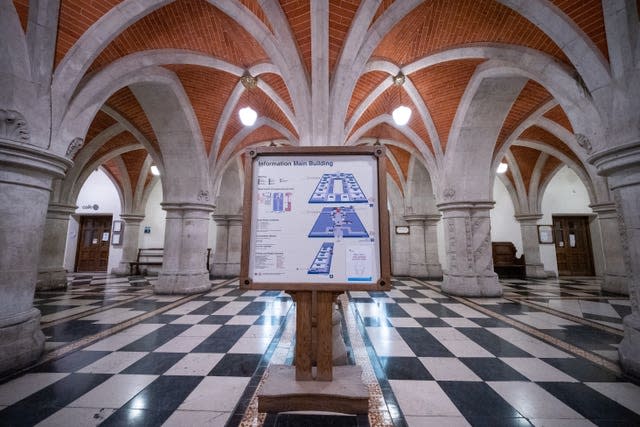Campaign group challenges lawfulness of arms sales to Saudi Arabia
A campaign group has begun a High Court fight with the Government over arms sales to Saudi Arabia.
Campaign Against Arms Trade (CAAT) is challenging the lawfulness of a decision to continue licensing the transfer of military equipment to the Kingdom of Saudi Arabia for “possible use” in a war in Yemen – and has taken legal action against International Trade Secretary Kemi Badenoch.
Lawyers representing the Government dispute CAAT’s “judicial review” claim and say it should be dismissed.
Two judges, Lord Justice Popplewell and Mr Justice Henshaw, started to consider evidence at a High Court hearing in London on Tuesday.
The hearing is due to end later this week.
CAAT won a similar fight in 2019, when Court of Appeal judges said continuing to license military equipment for export to Saudi Arabia was unlawful.
The Government said then that it would temporarily halt the granting of new licences to export arms to the Saudis.
CAAT says it has returned to court because sales have resumed.
Ben Jaffey KC, who is leading CAAT’s legal team, told judges in a written argument: “Campaign Against Arms Trade challenges the lawfulness of the continuing decision of the Secretary of State for International Trade that she will continue to grant licences for the transfer of military equipment to the Kingdom of Saudi Arabia for possible use in Yemen and that she will not suspend existing licences.
“There has been a large-scale war in Yemen since 2014.

“In March 2015, the Kingdom of Saudi Arabia, and a number of other countries from the region, intervened in that conflict via a Saudi-led coalition.
“The war has been notorious both for its grave humanitarian consequences and because of the evidence of serious violations of international humanitarian law perpetrated by all sides in the conflict.
“The UK exports much of the military material (including bombs, aircraft and related equipment) used by the Kingdom of Saudi Arabia in Yemen.”
Mr Jaffey said appeal judges quashed “previous decisions not to suspend extant licences” and to “continue to grant new licences” in 2019.
He said, following that ruling, former prime minister Liz Truss, then the international trade secretary, “modified her decision-making process” and retook the decision on whether to grant licences.
“On July 7 2020, the secretary of state wrote to CAAT to outline her new decision,” Mr Jaffey added.
“She found that there was no ‘clear risk’ that such violations of international humanitarian law ‘may’ recur since she considered these breaches to be isolated and without an underlying pattern.”
Sir James Eadie KC, who is leading the Government’s legal team, said international humanitarian law “analysis” complied with the “correct legal approach” and was “rational”.
He said in written argument: “The process has been informed by analysis, carried out by the Ministry of Defence (MoD), of allegations of violations of international humanitarian law which are reported in the press or social media, or which are brought to its attention by, for instance, NGOs or UN bodies.
“In response to the single flaw identified by the Court of Appeal, the MoD developed its analysis of individual allegations to incorporate an assessment against the relevant principles of international humanitarian law.”
He said the “decision-making process” had already been the subject of an “exhaustive review” by judges.
“Save in one respect identified by the Court of Appeal, the Secretary of State’s approach was thoroughly endorsed,” he added.
“The international humanitarian law analysis clearly addresses the Court of Appeal’s concern.”

 Yahoo Movies
Yahoo Movies 
